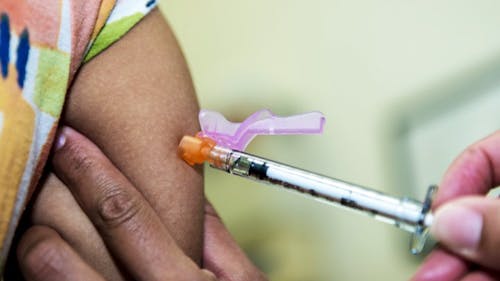Rutgers doctor breaks down meningitis, urges students to get vaccinated

Despite two separate cases of meningitis this year at Rutgers, the number of undergraduate students getting vaccinated remains relatively low.
Melodee Lasky, assistant vice chancellor for Health and Wellness, said as of last week, 17% of the “at risk population,” which is defined as undergraduate students living on-campus or off-campus, had been vaccinated for serogroup B meningitis since the start of the outbreak, which was in February.
The Daily Targum previously reported that a student was diagnosed with bacterial meningitis on Feb. 6. Later that month, on Feb. 26, the Targum reported that a second student was diagnosed with the disease, which was the same strain as the first case.
“We haven’t had a lot of students coming into the clinics that we have,” Lasky said. “We haven’t seen huge numbers.”
The largest turnout for attendees at a clinic was approximately 400 students, which she said does not compare to the goal of reaching the thousands of undergraduates at Rutgers.
The specific type of meningitis that the two students contracted this year is part of serogroup B, which is not covered under the vaccine that students are required to get in order to receive housing at the University.
Serogroup B has a different structure than the more common serogroups of meningitis, which include A, C, Y and W, Lasky said. As a result, a different vaccine is needed to treat serogroup B, a vaccine that is relatively new. The vaccine also differs because it only prevents serogroup B meningitis for a short period of time, meaning that students need to be revaccinated every year for it to be effective.
Some common misconceptions that students may have is that meningitis is not that severe, and that if they had the vaccination in the past, they do not need it again now.
“It can kill quickly,” Lasky said.
Though the initial symptoms of the disease, such as fever, headache and fatigue, are similar to common, less serious illnesses, meningitis can sometimes be preceded by these viral illnesses. Sometimes, within a day or two, people with the disease can die, with Lasky citing a fatality rate of 10 to 15%.
She added that of the people who survive the disease, approximately 15% of them can suffer side effects such as seizures, hearing loss and even losing limbs.
No other school in the state has had two separate outbreaks, Lasky said. A few years ago in 2016, two other students were diagnosed with meningitis, and similar to this year, they had the exact same strain of the disease. There was no relation between the meningitis outbreak in 2016 and the one this year, though, Lasky said.
Meningitis is spread through very close contact, which includes sharing water bottles, eating utensils and lip balm, and the best method of prevention is vaccination.
Students who want to be vaccinated also have to go through the whole series, which can either be 2 or 3 doses depending on the type of vaccine they get, the two most popular being Bexsero and Trumenba. According to the Meningitis B Action Project, “Trumenba (Pfizer) is either a 2-dose series with doses administered at least 6 months apart or a 3-dose series with the second and third doses administered 1-2 and 6 months after the first dose. Bexsero (GSK) is a 2-dose series with doses given at least 1 month apart.” Students also needed to fill out the immunization form on the Rutgers Health website, and enter the dates that they received previous vaccines, Lasky said.
“I really don’t want to have somebody who dies, or loses limbs … I don’t want to see that for any of our Rutgers students, and this is the best way to prevent the disease,” she said.



